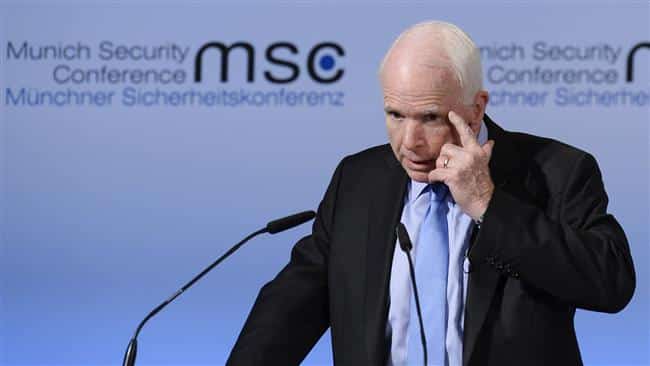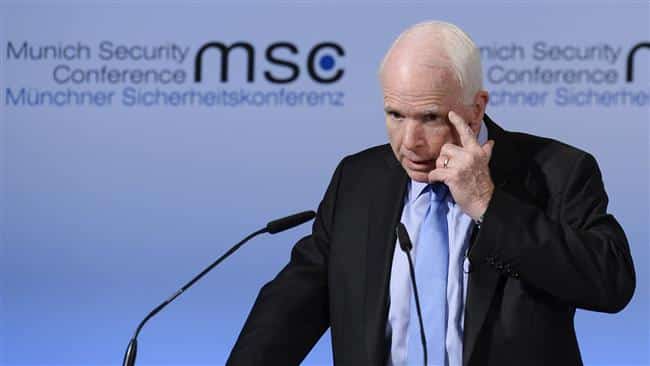The Munich conference held over the weekend – an annual event that brings the leaders of the Atlantic alliance together to celebrate their hegemonic pretensions – was anything but celebratory this time around. Despite the assurances of Vice President Pence that America’s commitment to NATO is “unwavering,” the Euro-crats in the audience were miffed that he failed to mention the European Union. And while they agreed, at least in public, with US admonitions that they have to start fulfilling their obligations to devote at least 2 percent of their budgets to defense, the reality is that there is very little will to do so: for example, the Brits are now boasting that they have brought their military expenditures up to speed, but as Peter Hitchens points outthey only did this by adding in the cost of military pensions, i.e. cooking the books.
And while Pence averred that the US would “hold Russia accountable,” he also said that the US would seek to cooperate with Moscow – not at all reassuring for the hawks in the audience, especially the Baltic states and the virulently anti-Russian Brits, who oppose any accommodation whatsoever. With US troops (sent by the Obama administration) on Poland’s border with Russia, tensions have risen, and as the War Party’s McCarthyite campaign tying the Trump administration to Russian intelligence intensifies, the battle over US foreign policy is taking center stage.
Sen. John McCain, the Senate’s leading warmonger, is at the forefront of the fight: in a speech delivered at Munich, he took direct aim at Trump – without having the courage to name him, of course. Assailing the “blood and soil” nationalism that is supposedly taking root not only in Europe but also in the US, McCain noted with sympathy the “alarm” with which the founders of NATO would view the new trend:
But what would alarm them most, I think, is a sense that many of our peoples, including in my own country, are giving up on the West … that they see it as a bad deal that we may be better off without … and that while Western nations still have the power to maintain our world order, it is unclear whether we have the will.
The speech was full of faux-Churchilian rhetorical flourishes, with frequent references to Western “values,” but was remarkably free of actual substance. What, for example, do these “universal values” mean in the face of Turkey’s Recip Erdogan, whose regime is jailing thousands for “sedition,” and setting its sights on our Kurdish allies who are fighting ISIS? So much for NATO’s commitment to these supposedly “universal” values.
And where, exactly, is “our world order”? The world is in chaos, thanks in large part to people of McCain’s ilk, who led us into the Middle Eastern quagmire and plunged that region in a maelstrom of violence that has only escalated since George W. Bush’s fateful decision to invade Iraq. The attack on Libya, which McCain fulsomely endorsed, decimated that country and created a terrorist paradise where none existed before. And in Syria, McCain championed radical Islamists who sought to overthrow the government and slaughtered tens of thousands – sparking an exodus of refugees now flooding into Europe and destabilizing the very governments the Arizona Senator is so eager to reassure.
I’m glad to see I’m not alone in my analysis of McCain’s utter wrongness. In an appearance on ABC’s “This Week” this [Sunday] morning, Sen. Rand Paul (R-Kentucky), gave it to Mad John with both barrels:
Everything that he says about the president is colored by his own personal dispute he’s got running with President Trump, and it should be taken with a grain of salt, because John McCain’s the guy who’s advocated for war everywhere. He would bankrupt the nation. We’re very lucky John McCain’s not in charge, because I think we’d be in perpetual war…
I would say John McCain’s been wrong on just about everything over the last four decades. He advocated for the Iraq War, which I think destabilized the Middle East. If you look at the map, there’s probably at least six different countries where John McCain has advocated for us having boots on the ground.
Amen, brother!
One thing McCain isn’t wrong about is that there is considerable opposition in the political class to the new turn in American foreign policy, and the core of it was present in Munich:
I know there is profound concern across Europe and the world that America is laying down the mantle of global leadership. I can only speak for myself, but I do not believe that is the message you will hear from all of the American leaders who cared enough to travel here to Munich this weekend. That is not the message you heard today from Secretary of Defense Jim Mattis. That is not the message you will hear from Vice President Mike Pence. That is not the message you will hear from Secretary of Homeland Security John Kelly. And that is certainly not the message you will hear tomorrow from our bipartisan congressional delegation.
The old order isn’t going to give up without a fight: that’s why we see the Deep State openly trying to undermine – and overturn – the Trump presidency. “Our world order” is backed to the hilt by an interlocking network of economic and political interests that have profited from the status quo – and they’ll fight to the death to preserve it. Right now within the administration there are competing factions battling it out for control of our foreign policy, with the GOP Establishment – chief of staff Reince Priebus, Pence, and Secretary of State Rex Tillorsen – arrayed against the so-called ideologues, represented by Steve Bannon and Stephen Miller, who are close to the President. The latter want a grand deal with the Russians, and a basic realignment of our alliances, while the old Republican guard – and especially the Saudi lobby — wants to preserve the status quo at all costs.
McCain, and his co-warmonger Lindsey Graham, hope to mobilize the bipartisan foreign policy Establishment and throw a monkey wrench into any effort to rip up the many tripwires that would drag us into a conflict with Russia. Yet they are generals without an army: polls show that Americans don’t consider Russia much of a threat to the US, and this is true especially among Republicans. And there is no appetite among the general public for a confrontation with Moscow: that sentiment is limited to the Washington Beltway.
What this means is that a grassroots effort to beat back the War Party and make some real changes in our foreign policy is not only possible but also very likely – provided anti-interventionists make their voices heard.
Reprinted with permission from Antiwar.com.


